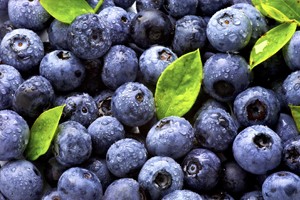7 Wonderful Reason to Love Blueberries
 Of the many fascinating and delicious fruits and vegetables that are native to the American continents, one of the most loved is the blueberry. This small berry is a dark indigo color and has the distinction of being one of the few naturally blue plants on the planet. Found in the wild and grown in gardens, blueberries are enjoyed year round in all kinds of baked goods and snacks as well as on top of salads and in smoothies and other beverages. Though this fruit has been prized for generations for its sweet, fresh flavor, blueberries actually have a wide range of nutritional benefits that we are only now discovering. Join PurMedica in exploring seven reasons to eat more blueberries.
Of the many fascinating and delicious fruits and vegetables that are native to the American continents, one of the most loved is the blueberry. This small berry is a dark indigo color and has the distinction of being one of the few naturally blue plants on the planet. Found in the wild and grown in gardens, blueberries are enjoyed year round in all kinds of baked goods and snacks as well as on top of salads and in smoothies and other beverages. Though this fruit has been prized for generations for its sweet, fresh flavor, blueberries actually have a wide range of nutritional benefits that we are only now discovering. Join PurMedica in exploring seven reasons to eat more blueberries.
1. Blueberries are packed with antioxidants
When nutritionists recommend that people each fruits and vegetables that have a rich, dark color, they are actually helping us select foods that have the highest natural antioxidant content. Blueberries, like many other dark fruits, have a remarkable amount of antioxidants. Antioxidants are compounds that help counteract the damage caused by unattached oxygen molecules that seek out cells to latch onto. These free radical molecules may play a key role in aging, so preventing this damage may help stave off the damage associated with the aging process.
2. Blueberries can benefit cognition and memory
A recent study on the effects of blueberries and their chemical compounds have shown a these fruits have the potential to boost the memory and recall ability of older adults. This study tracked a cohort of older adults (average age 76 years) who consumed two to two and a half cups of blueberry juice daily for 12 weeks. The study participants showed improved scores on memory tests, suggesting that further study could reveal additional benefits.
3. Organic varieties of blueberries might have higher concentrations of antioxidants
Some research comparing the antioxidant content of different blueberry varieties revealed that the conventional (non-organic) Bluecrop variety had a lesser concentration of health-promoting antioxidants. Organic varieties, on the other hand, had higher concentrations of both phenol and anthocyanine antioxidants, which included compounds such as malvidins, petunidins, and dephinidins. This is valuable data for people who wish to maximize the antioxidant load of the foods they choose. If you are looking to load up on antioxidants, make sure to look for organic varieties. These can be found in some grocery stores and sometimes in farmers markets.
4. Frozen blueberries have a nearly identical nutritional profile as fresh
Though people are sometimes concerned that freezing fruits and vegetables damages the nutritional profile, research has shown that the antioxidants in blueberries, including anthocyanin, are not damaged by the freezing process. This is good news for anyone who wishes to enjoy blueberries all year round. You can stock up on the fruit at the height of the season for freshness and flavor, then freeze several quarts at home to enjoy months later.
5. Blueberries can be easily added to many different meals and snacks
While you might struggle to creatively integrate some nutritional foods into your meals, blueberries are always a welcome addition. Try some blueberries with:
-
A fresh green garden salad
-
Traditional, tapioca, or chia seed pudding
-
Greek yogurt or traditional yogurt
-
Oatmeal, farina, or other hot breakfast cereals
-
Biscuits and fresh butter
-
A fruit and cheese platter

